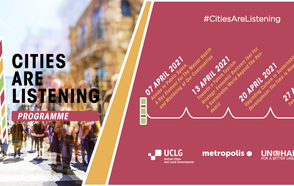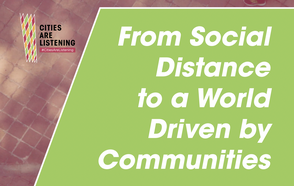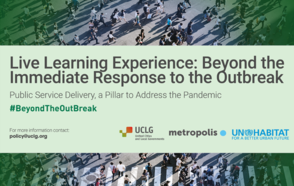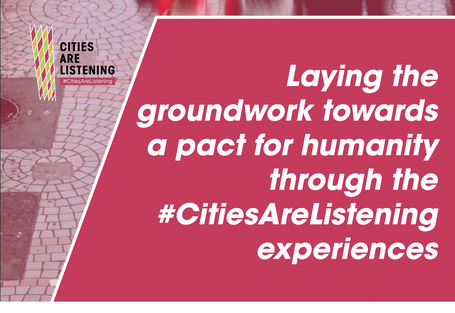
The mandate that our centenary movement has is clear: it is time to move from social distance to a world driven by communities. In order to achieve this, it is necessary to deepen the democratic process and transformation of cities and territories. We have to promote transformative actions to take responsibility for future generations and to leave no one and no place behind.
On Thursday, 22nd of October, the #CitiesAreListening experience took place in the form of an open conversation between María Fernanda Espinosa, President of the 73 UN General Assembly, and Dr Vasu Gounden, Founder and Executive Director of ACCORD, in which they tackled the measures that needed to be taken to ensure a structural shift in the multilateral system to ensure that we move from the dystopian visions that arise from the pandemic, to a Citopia: a world driven by peaceful cities.
Emilia Saiz, UCLG Secretary General, opened the conversation highlighting the strategic value of the #CitiesAreListening Experiences, commending the commitment from all stakeholders towards the conversations, and calling on the need to consolidate the space as one of co-creation, involving the voices of our communities in a way that will allow to strengthen our advocacy towards the international system and amplify their voices.
“We propose #CitiesAreListening to become the core group to shape one of the 3 pacts that we are proposing: the pact for people. We need to develop a new generation, to renew the multilateral system based on values” Emilia Saiz, UCLG Secretary General
María Fernanda Espinosa commended the work of local and regional governments during the pandemic, who have often worked both for short-term and long-term goals in an uncertain environment. She called on how to ensure that local and regional governments are represented in the universal agendas by linking local regional governments with multilateral actors, and engaging with the multilateral system in multilateral settings.
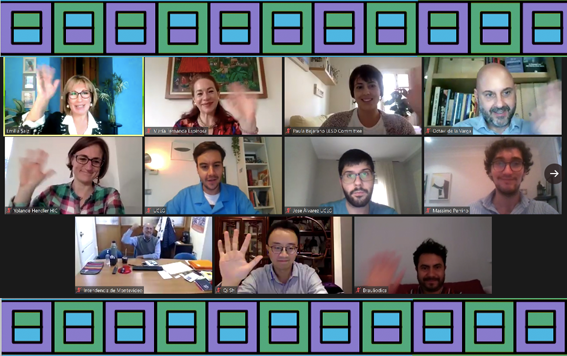 “We need to re-make the case, narrative, and numbers, for local governments. We need to engage with the multilateral system in multilateral settings. Local governments and associations need to be linked with multilateral actors.” María Fernanda Espinosa, President of the 73 UN General Assembly
“We need to re-make the case, narrative, and numbers, for local governments. We need to engage with the multilateral system in multilateral settings. Local governments and associations need to be linked with multilateral actors.” María Fernanda Espinosa, President of the 73 UN General Assembly
Dr. Vasu Gounden laid out the way towards Citopia, highlighting how they are based on new values, of social justice, of freedom, of respect for human rights in order to create new citizenships and renew the social contracts. Local governments, he argued, are set to become he epicenter of service provision in this new Citopia in order to ensure sustainable societies based on social responsibility. Dr. Gounden also argued that, to transform society, representation is not enough, and that to shape the universal agenda, carrying out a strong, joint advocacy is an integral part of the experience.
“UBUNTU is an important concept to carry out transformation. It is about interdependence, about an intergenerational and environmental contract. If we look at the social compact, we have to look at interdependence.” Dr. Vasu Gounden, Founder and Executive Director of ACCORD
Octavi de la Varga, Secretary General of Metropolis, coincided on the need to create cities and societies built on values, and argued to establish the link between culture, values, and cities, in order to build a new system of governance that does not repeat the same mistakes as national governments.
The open dialogue that followed brought the visions of Luz Amparo Medina, from the City of Bogotá, who contributed the conversation on values by highlighting the need for a renewed social, environmental and governance contract to ensure a green future for our communities. The urgencies that we are facing mean that we cannot afford to leave people out of the decision-making, she argued, and it is integral to bring the concept of care to the conversation.
Sophia Torres, from the Habitat International Coalition, argued, as participants had done before, that values are key, but that it is also essential to think about how to apply these values to the reconstruction after the COVID-19 pandemic, and the role that service delivery plays in this reconstruction.
What comes next for CitiesAreListening?
The rest of the session was dedicated to the future areas of focus for the #CitiesArelistening Experience, and was introduced by Octavi de la Varga, who argued that the system that we are currently in needs to transform to the new needs and realities.
Jessie Post, Project Manager of VNG International, highlighted the impact of COVID-19 on local development cooperation, and argued that the focus was in three challenges: transfer to more distant learning, enhance our efforts to care and support the vulnerable. She called to use a joint position as a basis for dialogue with national governments on the role of local and regional governments in the universal agendas.
Puvendra Akkiah, IDP Manager of the eThekwini Municipality, proposed a follow-up #CitiesAreListening session on open space, and how its transformation is integral for the conversations of development. He argued for the need to look at linkages between health, and mental health and public officials, and showcased the importance of building confidence to ensure that citizens return safely to public spaces.
Laura Healy, Policy and Advocacy Specialist of UNICEF, expressed the support of the Agency to #CitiesAreListening. These exchanges, she argued, are as a step to translate our proposals into concrete actions, to build on the solutions that are already happening to protect the most vulnerable.
Paula Bejarano, from the Committee on Local Economic and Social Development, proposed a consultation strategy to set local economic development as the basis for the reconstruction within the framework of #CitiesAreListening.
Yolande Hendler, Secretary General of Habitat International Coalition, addressed what is currently missing to make communities the protagonists of the global agenda: a space for the civil society networks to engage other networks, and the ability of agencies to establish conditions to hold global actors accountable. She highlighted how developing a partnership between communities, the civil society, and local and regional governments can bring the potential safeguard universal development, through commitments with the civil society and local and regional governments.
Emilia Saiz wrapped up the session highlighting that we are at a key moment for coming together with a very similar narrative, safeguarding the universal agendas to safeguard the dreams and aspirations of our communities. She argued that reaching the decision-making table is important, but that it is critical now to ensure we have defined what we are bringing to the table.
The #CitiesAreListening Experiences are set to continue with the themes defined during the session, among others, and will be an integral part of constructing the Pact for People to ensure that our communities are included in the decisions that affect them.
- Visit the Live Learning Experience Knowledge Hub
- Read the UCLG Decalogue for the COVID19 Aftermath











